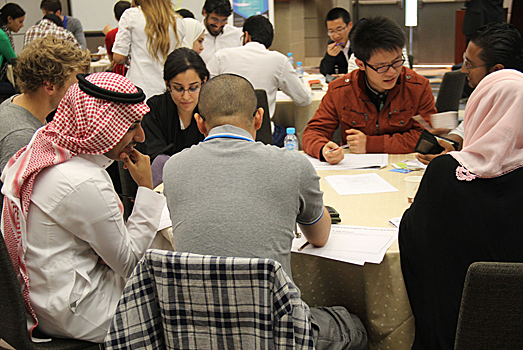New KAUST Entrepreneurship and Innovation Programs Offer KAUST Students and Saudi Companies Something Different

There has never been a better time to be an innovator or entrepreneur in Saudi Arabia. Support for new business ventures and the creation of an innovation ecosystem – one that will transform the Kingdom's economy – is key to KAUST's mission, spearheaded by the university's Innovation and Economic Development department.
During the course of the Winter Enrichment Program (WEP) at KAUST, the Entrepreneurship Center has run several programs marking the start of an Innovation Academy style of modules that are aimed at promoting an innovation culture both within the university's community and in a wider ecosystem of companies, nonprofits and government organizations.
"A key part of economic development in any country is to develop both entrepreneurs and company innovation at all levels of society," says Gordon McConnell, manager of the KAUST Entrepreneurship Center.
"As a team, we have been listening to KAUST's internal and external stakeholders, and the programs run in January show the range of teaching and learning that KAUST is making available now."
ICE in the Desert and Accelerated Lean Launchpad
With the University degree programs exclusively focused on disciplines of science and technology, large numbers of KAUST students were eager to learn the business skills that will allow them to think beyond their disciplinary areas, sell their ideas and approach problems in novel ways.
Two of these programs were part of KAUST's Winter Enrichment Program (WEP), which covers activities ranging from science and technology to arts, sports and culture. The programs are developed in-house and taught by experts from KAUST's Entrepreneurship Center, with support from national and international collaborators.
The first program, Innovation, Creativity and Entrepreneurship (ICE) in the Desert, took participants through an introductory overview of modern business practices. It covered general principles of innovation, creativity and entrepreneurship that are both crucial for success in today's business world and are important constituents in innovative research projects. Topics included design thinking, idea generation, intellectual property, evaluating and marketing innovation projects, financing and venture funding and the best ways to exit a startup.
The program also featured two classes on social entrepreneurship and starting community-oriented businesses by Dr. Sarah Ghaleb, General Manager of Education & Poverty Alleviation Initiatives at Abdul Latif Jameel Community Initiatives.
She was pleased to see how engaged students were: "In our first session, I was trying to feel the room and was very happily surprised at how many students were very interested in starting their own social businesses," she says, adding that a few of the students have already taken the steps to move their ideas to the next step.
The second program, Accelerated Lean Launchpad, took place the following week. It provided more advanced modules featuring the Lean Launchpad material taught in entrepreneurship programs globally and in previous WEP programs. This program targeted faculty and students who had potentially patentable inventions or were considering starting a new venture or applying for funding.
Building "Intrapreneurship" in Saudi Companies: the REVelate Innovation Program
Nurturing innovation within KAUST is not the extent of the university's commitment to the Kingdom's economy.
In parallel with the WEP sessions, KAUST delivered the second round of the successful REVelate corporate innovation program. Run by the Entrepreneurship Center in conjunction with the Industry Engagement team, the program coached returning members from KAUST's in-Kingdom corporate partners. It also showcased the visible progress of some of the corporate projects started in the first round.
"The corporate teams are different because they are already in their careers," says Charlie Lewis, one of the program instructors and Vice President of New Ventures at Arizona Technology Enterprises at Arizona State University.
"The concept of entrepreneurship is unique for them. They are applying it within their place of employment."
Shafi Alhsaien from Saudi Electricity Company's R&D division attended both rounds of REVelate. He and his team propose creating a professional lab for the testing and maintenance of electricity-generating gas turbines in the Kingdom.
"We got a lot out of this program," he says. "We learned how to present our value proposition, how to define our customers and collaborators, how to sell the potential service and how to calculate cost. Without REVelate, we wouldn't have had a clear understanding of how best to do this."
Three major collaborators in the utilities market have now taken on Alhsaien's concept with a view to implementing it.
Another program instructor, Jay Connor, Founder and CEO of Learning Ovations Inc., was impressed by the progress participants made during the week.
"The goal was for each of the teams to make an effective presentation of their product or business idea," he says.
"On Monday, very few had a clear sense of what they wanted to do, let alone how to do it. Through the various lessons and coaching, we saw tremendous progress. The teams learned how to create a story around a problem, and explain how they were going to solve it."
Building Entrepreneurial Mindsets for the Future
These programs have been designed to offer unprecedented benefits uniquely suited to the region. They are focused on long-term outcomes and aimed at helping students not just in their current roles but also in their future careers. They also aim to help organizations establish entrepreneurship as an embedded cultural trait and cultivate ways of thinking that will help them remain competitive for years to come.
The success of theseprogram means that a range of new programs for the wider Saudi economy will be created.
An upcoming three-day REVelate Foundation Program in Innovation will start March 22, 2015.
For those in the KAUST community, the Center runs evening classes on a range of innovation and entrepreneurship topics each month.
Contact entrepreneurship@kaust.edu.sa to learn more.

